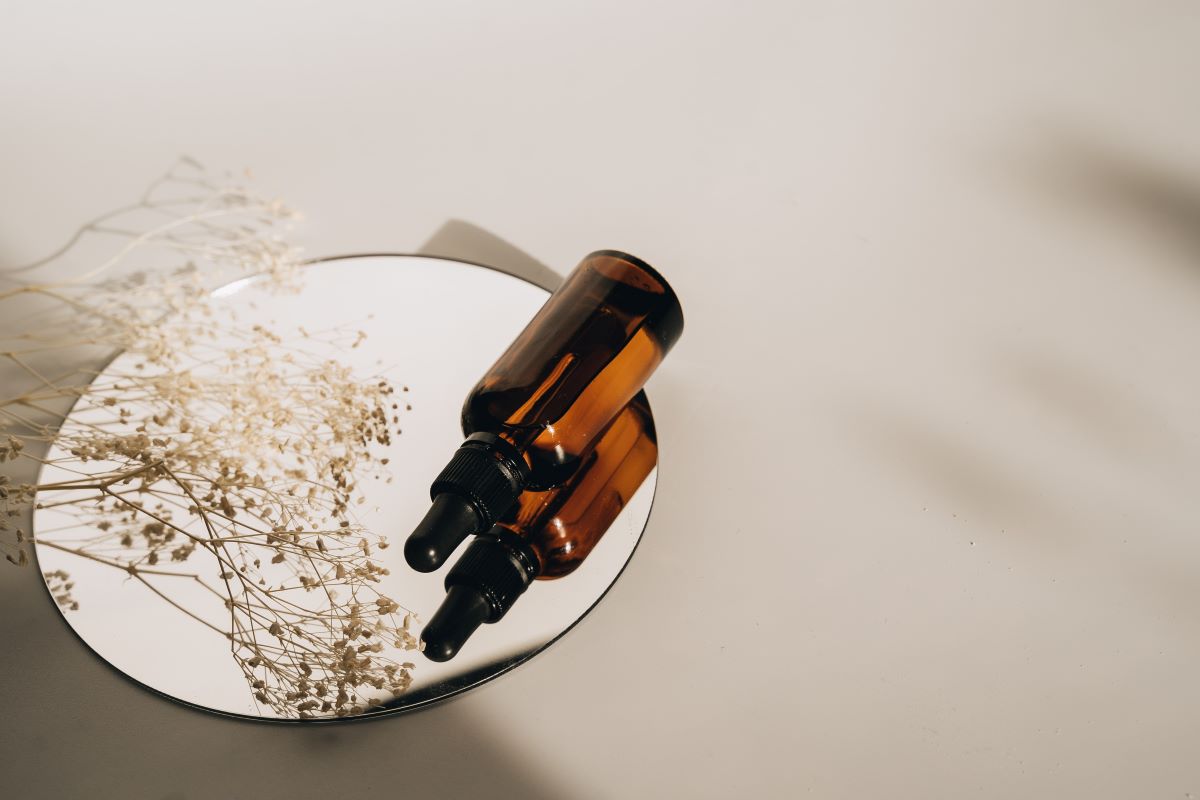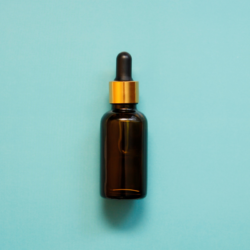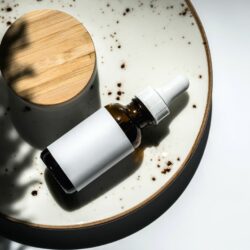In the 18th century, indigenous peoples made a remarkable discovery in the semi-arid regions of southern Arizona, southern California and north-western Mexico. They learned to exploit the precious seeds of the Simmodsia chinensis bush, better known as jojoba. By heating and grinding these seeds, they obtained an ointment rich in jojoba oil, a resource with extraordinary properties. This ointment, originally intended for use as a cosmetic ingredient for the skin and hair, also had repairing properties for animal skin.
However, there was a time when products based on sperm whale blubber predominated in the cosmetics industry, before a ban on whaling in the 1970s led to a ban on imports of these and other animal waxes. Jojoba oil, derived from this resilient plant, became an invaluable alternative for moisturising and caring for the skin.
In this article, we’ll explore in detail what jojoba oil has to offer skin health. We’ll dive into its history, its unique properties and how you can incorporate it into your skincare routine to reap its benefits. Discover how this exceptional vegetable oil, often referred to as “desert gold”, can improve your skin and your cosmetics.
What is jojoba oil?
Jojoba oil is the precious product obtained from the seeds of the jojoba bush, scientifically known as Simmodsia chinensis. Native to the semi-arid regions of southern Arizona, southern California and north-western Mexico, jojoba is a resilient plant that has attracted attention for centuries.
The extraction of jojoba oil has evolved significantly over time. In the past, traditional methods involved heating jojoba seeds, then crushing them to extract the precious oil. However, with advances in technology, modern extraction methods have been developed. Today, jojoba oil is extracted mainly by cold pressing, a process that carefully preserves the beneficial properties of the oil without altering its quality.
This modern extraction process ensures that jojoba oil retains its essential constituents, such as fatty acids, which make it a versatile skin and hair care product. This vegetable oil, which is non-greasy to the touch, is now widely used in the cosmetics industry for its moisturising, nourishing and protective properties, while complying with the highest quality standards.
So, whether for its traditional origins or its modern extraction methods, jojoba oil remains a precious resource that deserves a special place in your skincare routine.
What properties does this oil have for the skin?
Made up of 97% waxy esters, jojoba oil belongs to the wax family rather than the oil family. Non-greasy to the touch, it contains numerous fatty acids such as: gadoleic acid (65 to 80%), erucic acid (10 to 22%), oleic acid (5 to 15%), as well as others, but in smaller proportions: palmitic acid, palmitoleic acid, stearic acid, linoleic acid, gamma-linolenic acid, arachidic acid, nervonic acid.
Soothing
Jojoba oil is generally used to treat acne, psoriasis and eczema. Jojoba oil’s antiseptic and disinfectant properties limit the concentration of harmful bacteria on the skin. At the same time, it soothes inflammation, wounds, itching, dryness and redness.
Moisturising
Jojoba oil helps to soften and improve the appearance of the skin (don’t forget it for chapped skin!). Acting as an emollient, jojoba oil helps retain water in the different layers of the epidermis. Transepidermal water loss occurs when the skin barrier is unable to prevent moisture from evaporating into the air. With age, the skin barrier is less able to retain moisture, which is why ageing skin is often more dehydrated and dull.
Antioxidant
Jojoba oil is an excellent source of vitamin E. Vitamin E is an antioxidant that helps protect the skin against oxidative stress and free radicals.
How can I incorporate it into my skincare routine?
Jojoba oil is an emollient (3). In other words, it softens, moisturises and smoothes the skin. It is used to seal in moisture, soothe and also to remove make-up.
All you need to do is moisten a cotton pad or reusable square with a few drops of oil. Then remove your make-up as you would your usual cleanser. What’s more, if you can’t stand soap-based cleansers, you can also cleanse your whole face in the same way.
The waxy side of jojoba oil helps to form an occlusive film on the surface of the skin: in short, this creates a protective “barrier” and prevents trans-epidermal water loss. In principle, during the night, the body’s temperature drops, while that of the epidermis rises. As a result, the PH of the epidermis can become more acidic, which means a lot of work for the cells. As a result, the skin barrier tends to let water evaporate more easily while we sleep.
It can be interesting to use jojoba oil as the last step in your skincare routine: in practice, this involves applying the oil to your face, after moisturising your skin, to seal in the moisture (jojoba oil should be applied with your fingertips once your skin has absorbed all your night cream).
Is jojoba oil a remedy for acne?
Acne is one of the most common skin problems and can be particularly worrying, especially for those who suffer from it. In this respect, jojoba oil has attracted growing interest as a potential treatment for acne. Let’s take a closer look at the properties of this plant oil and its effectiveness in combating acne.
- Composition of jojoba oil: Although limited phytochemical research has been carried out on plant extracts, the composition of the liquid wax obtained by direct expression of jojoba seeds has been extensively studied. This oil has been found to be a source of liquid gold, showing great structural similarity to spermaceti wax, which is used in many pharmaceutical products.
- Traditional use and emollient: Traditionally, jojoba oil has been used to treat numerous skin and scalp disorders. Its emollient effect has been extensively studied and proven, meaning it can soften and moisturise the skin.
- Anti-inflammatory properties: Jojoba oil has also been shown to have anti-inflammatory properties, making it useful for treating acne, a condition often associated with skin inflammation (2).
- Antibacterial and antiviral effect: Studies have also shown that jojoba oil has substantial antibacterial and antiviral properties. In the context of acne, where bacteria can play a key role, this could be beneficial.
- Anti-hypercholesterolaemic effect: It’s also interesting to note that jojoba extract has shown potential properties in helping to reduce high cholesterol.
- Topical application: Jojoba oil is commonly used in cosmetic formulations, including sunscreens and moisturisers. It can also improve the absorption of topical medications (1).
- Skin barrier repair: Due to its high wax ester content, jojoba oil can be an interesting option for repairing dermatoses with changes to the skin barrier, such as seborrhoeic dermatitis, eczematous dermatitis, atopic dermatitis (AD) and acne. Jojoba oil offers additional protection against transepidermal water loss.
Increase the effectiveness of your retinol with jojoba oil
Retinol, a well-known active ingredient in skincare, can provide many benefits, but it can also have a dehydrating effect on the skin, leading to redness and flaking over time. However, technologies that improve the skin permeability of retinol are revolutionising its use. Among these, jojoba oil stands out as a versatile solution for improving the efficacy of retinol.
How does this improvement work? The secret lies in the structure of the skin. The stratum corneum, made up of keratin proteins (corneocytes), acts like bricks within a lipid matrix (the mortar) that acts like cement in a wall. For the active ingredients to penetrate the skin effectively, it is essential to ‘soften’ this lipid mortar to allow the active ingredients to bypass the keratin-based ‘bricks’. This is where jojoba oil comes in.
Jojoba oil: a perfect mimicry of the skin Jojoba wax esters are strikingly similar to the sebaceous lipids naturally present in our skin. This means that jojoba oil can improve the passive penetration of lipophilic active ingredients, such as retinol, by allowing better diffusion of solubilised active ingredients.
Proven by science A recent study by Vantage Specialty Chemicals used an advanced skin test model called skin-PAMPA to demonstrate the effectiveness of jojoba oil in improving skin penetration of retinol. The results were spectacular. Formulations containing 1.0% retinol and natural jojoba oil showed up to a 40-fold improvement in skin penetration of retinol compared with similar formulations without jojoba oil. In contrast, a conventional vegetable oil, such as soya oil, did not demonstrate the same ability to improve skin penetration.
Why does jojoba oil work so well? One of the main reasons for its effectiveness is jojoba oil’s similarity to human sebum, our own natural oil. This unique affinity allows jojoba oil to improve the delivery of retinol to the skin in an exceptional way.
The benefits for your skin By improving the skin’s ability to absorb retinol, formulas containing jojoba oil allow formulators to reduce the concentration of retinol required, thereby limiting the effects of skin dehydration often associated with this ingredient. What’s more, jojoba oil is renowned for its moisturising benefits, offering additional protection against skin dryness.
My shopping list at Soin & Nature :
Here are some of my favourite products. You’ll find them in our online pharmacy!
- LCA jojoba oil
- Natessance
- Phytosun Arôms
- Naturactive
- Propolia night cream
- Docteur Valnet massage base
- Di Nina Divine Serum
Source of supply:
- (1) https://www.ncbi.nlm.nih.gov/pmc/articles/PMC9901458/
- (2) https://www.ncbi.nlm.nih.gov/pmc/articles/PMC5796020/
- (3) https://www.ncbi.nlm.nih.gov/pmc/articles/PMC8197201/
- https://www.ncbi.nlm.nih.gov/pmc/articles/PMC8197201/
- https://www.karger.com/Article/Abstract/338076
FAQ
- What is jojoba oil?
Jojoba oil is a vegetable oil extracted from the seeds of the jojoba bush (Simmondsia chinensis), a plant native to the desert regions of the south-western United States and northern Mexico. It is known for its moisturising, nourishing and protective properties for the skin and hair.
- What are the benefits of jojoba oil?
Jojoba oil has a number of benefits for the skin and hair, including:
- Moisturising: It hydrates the skin without leaving a greasy residue and helps retain moisture.
- Sebum regulation: It mimics the skin’s natural sebum, helping to regulate sebum production and prevent oily skin problems.
- Anti-inflammatory and healing properties: It can reduce redness and skin irritation and promote wound healing.
- Hair care: It nourishes and moisturises the hair, making it softer, shinier and easier to style.
- How do I use jojoba oil?
Jojoba oil can be used in a variety of ways:
- As a skin moisturiser: Apply a few drops to clean skin and massage gently.
- For hair care: Apply a few drops to the ends of dry or damp hair to nourish and protect it.
- As a make-up remover: Apply a few drops to a cotton pad and gently wipe the face to remove make-up.
- For massage: Mix jojoba oil with a few drops of essential oil to create a personalised massage oil.





